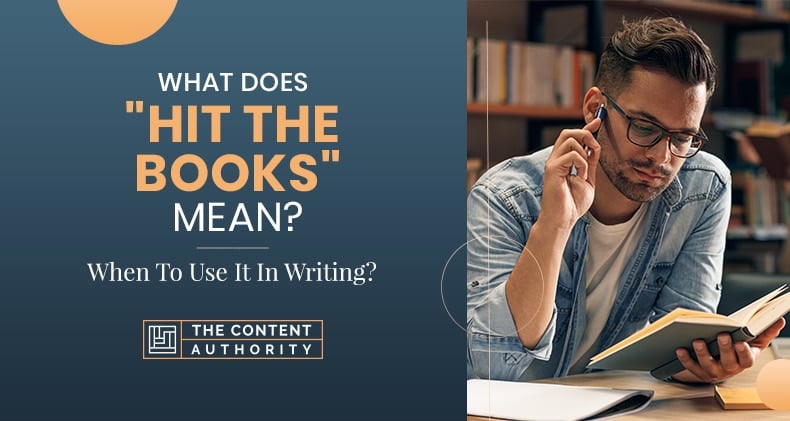Maybe you didn’t study when you had the time, now the deadline is close and someone advises you to “hit the Books”. But what do they mean?
The idiomatic expression “hit the books” means “to study”, especially with a certain intensity. The use of “hit” in this expression refers to beginning something or to start. When you “hit the books”, you study hard and read a lot about something.
What Is The Meaning Of This Idiomatic expression?
When you “hit the books”, you learn by reading books and doing research. The purpose of this concentrated and exhaustive effort of reading and research is to acquire a new skill or new information. This idiom is just a fun way of saying “study”.
Origin Of The Phrase “Hit The Books”
Although no one really knows the origin of the phrase. It’s obvious that this saying is a fairy contemporary one, most likely originated in the mid-20th century.

Synonyms, Antonyms, And Related Idiomatic Expressions
Synonyms For “Hit The Books”
- Read
- Learn
- Grind
- Work
- Novels
- Mega-study
- Consider
- Lucubrate
- Ponder
- School
- Revise
- Acquire
- Grasp
- Examine
- Comprehend
- Studying
- Review
- Cram
- Edify
- Coach
- Enlighten
- Develop
- Instruct
Antonyms Or Opposite Idioms to “Hit The Books”
- Unlearn
- Desert
- Ignore
- Quit
- Renounce
- Withdraw
- Neglect
- Indoctrinate

Similar or Related Idiomatic Expressions to “Hit The Books”
Apply Oneself
An idiomatic expression that means to put forth a concerted effort, to try; to focus.
Con
- To study, examine or pursue carefully.
- To learn or commit to memory.
- To direct the course or steering (of a vessel).
Crack A Book
An idiomatic phrase that refers to someone’s book, especially in order to study.
Study
- A branch of knowledge or department of learning
- To investigate; perform a study of;
A Few More Idioms
- Bury yourself in (the books)
- Learn the ropes
- Gain mastery
- Beat the game
- In the textbooks
- Beat the system
- Put your nose in a book
- Read a lot
- In the books
- On the books
- Burn the midnight oil
- Go hit the books
- Make hay while the sun shines.
- With the books
- Study intensely
- Bone up
- Show the ropes
Words That Include “Hit The Books” In The Dictionary
When searching in the dictionary, there are several words that mention “Hit the Books”. For example:
- Safe
- Bean
- Single
- Mistake
- Fly
- Mega
Nearby Idioms With The Same Structure As “Hit The Books”
In the same order, there are nearby words or phrases that are extremely alike to “Hit the Books”; they begin with “Hit the” or follow the same structure. Here are some other similar expressions we can use using the verb “hit”:
- Hit the sack – To go to bed.
- Hit the nail on the head – To be completely right about something.
- Hit or miss – Likely to be good as to be bad.
- Hit the day – To go to bed.
- Hit the gas – To accelerate.
- Hit the jackpot – To win a lot of money or to be successful.
- Hit the hay – To go to bed.
- Hit the deck – To drop down to the floor suddenly.
- Hit the bricks – To travel about, especially on foot.
- Hit the roof – To suddenly become very upset or angry.
- Hit the bottom – To reach the lowest point.
- Hit the ball – To do something extremely well.
- Hit the bullseye – To hit the center of a target.
- Hit the big time – To become successful or famous.
- Hit the dirt – To drop down to the ground suddenly
- Hit the big time – To become very famous and successful.
- Hit back – To attack or criticize someone after being attacked or criticized by them.
- Hit the spot – To be exactly right or to give complete satisfaction.
- Hit the buffers – To stop or fail.
- Hit the beach – To go to the beach.
- Hit the airwaves – To broadcast for the first time.
- Hit-skip – To flee from the site of a motor vehicle accident without reporting it to the police or emergency services
- Hit the bottle – To get drunk; to drink a lot of alcohol regularly.
- Hit the mark – To be correct.
- Hit the dance floor – To step into the dance floor.
- Hit the gym – To visit the gym.
- Hit the road – To leave or to start a journey.
When To Use It In Writing?
Here are some examples we can use as references when deciding what is the most appropriate way to use “Hit the Books”.

Sentence Examples:
- Danny was in danger of failing, so before his last math test, he left the show early to go home and hit the books.
- And he’s got to hit the books or he won’t be able to attend summer school.
- University students fretting about exams allegedly had options: hit the books or pay a bribe.
- All that did was inspire Lexie, who hit the books and took the test again.
- OK, kids, recess is over; time to hit the books again.
- When the other actors get a break on set, she hits the books.
- Sitting on a campus park bench, 19-year-old student Adra Martinez said her strategy is to hit the books.
- James Green was a strange boy, a loner who’d hit the books while classmates played soccer or pilfered neighbors apples.
- There is no reason if they were named that they can’t bring a tutor down to hit the books.
- Unthinkable! She hit the books hard, volunteered her time to help others, lives alone, and has built an enviable life.
- Then you have 20 more hours to hit the books, and some of us are up until midnight every night with that.
- The fearful financial panic hit the book heavily, for we published it in the midst of it.
How To Use “Hit The Books” In Different Tenses?
We use “hit the books” right after the person who is studying. Keep in mind that the verb “hit” does not change in the past tense.
Past Tense
The past tense of “hit the books” is the same as the infinitive and present tense of the original idiom, “hit the books”.
Example: The mandate, partially an outgrowth of the scandal at Penn State University, is one of 14 new laws that hit the books in Oregon when 2013 began.
Simple Present
The third-person singular simple present indicative form of hit the books is “hits the books”.
Example: It sounds like the ideal trade-off, and it’s one he will gladly make before and after he hits the books.
Present Participle
The present participle of hit the books is “hitting the books”.
Example: They go to the beach when they should be hitting the books and then they wonder why they get bad grades.
Past Participle
The past participle of hit the books is “hit the books”.
Example: We hit the books all last weekend.

Other Uses:
There are different scenarios where we can use the phrase “Hit the Books” and various areas where it can apply.
In Literature: “Hit The Books”
“The Letters Of Mark Twain, Complete” by Mark Twain (Samuel Clemens)
“Robert Elsmere” by Mrs. Humphry Ward
He keeps hitting the books with a little switch, and screamin’ out as if the house was afire.
“Captain Horace” by Sophie May
In News
It’s almost time for thousands of children throughout the Rio Grande Valley to hit the books again.
Coming Home From War to Hit the Books.
Thousands of college students will hit the books for another semester at the University of Kentucky this week.
As unearthed by Dr. Saturday, Manziel is presumably dating Sarah Savage, a Texas A&M undergrad who, when not hitting the books, does a little modeling.
As unearthed by Dr. Saturday, Manziel is presumably dating Sarah Savage, a Texas A&M undergrad who, when not hitting the books, does a little modeling.
See the movies or hit the books
ew.com
In Songs: “Hit The Books”
In his song “You’re for Me”, country singer Buck Owens uses this phrase:
stars that shine above fill my cup of love when you’re walkin’ along with me
Yes and you’ve sure got the look that can hit my book
Rock is not the exception when using common idioms. Blink-182 in their song “Quarantine” says:
People hit the bottle
Some people hit the books
Some people storm the Capitol
Some second-guess parenthood
In his song “The Firstar”, Mark Logan sings:
First I hit the books, then I hit the ice
Then I hit the bottle for a couple of nights
In Quotations: “Hit The Books”
“You’ve really got to start hitting the books because it’s no joke out here.” Spike Lee
Conclusion
Remember that adding idioms and expressions to your vocabulary – such as “Hit the Books” – will help you become a better speaker.
There is no need to try to learn a million idioms or expressions at a time! When you study new phrases and idioms consistently and steadily, that is when your vocabulary will improve and get better. Reading articles is encouraged in order to expand your vocabulary and learn useful idioms, slang, and expressions which are used a lot by native English speakers, such as this one.
Shawn Manaher is the founder and CEO of The Content Authority. He’s one part content manager, one part writing ninja organizer, and two parts leader of top content creators. You don’t even want to know what he calls pancakes.

